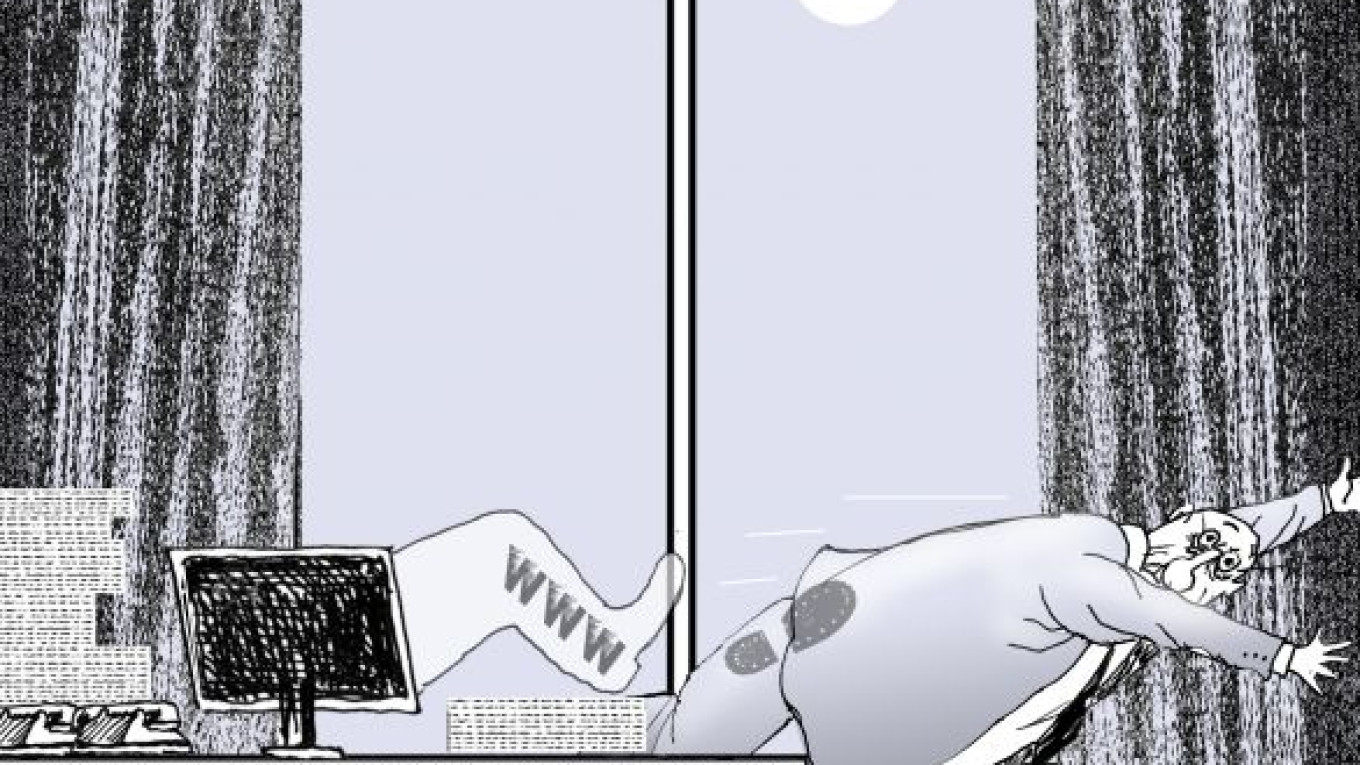Although the appointment of Deputy Prime Minister Sergei Sobyanin to the post of Moscow mayor was widely expected, the news set off a barrage of emotional opinions on the Russian Internet. Most were negative. Sobyanin was already being criticized for being a nobody, not a public politician and, most damningly, the closest associate of Prime Minister Vladimir Putin among all the candidates for mayor.
As blogger sergius1971 wrote, "Sobyanin is head of the board of directors of Channel One and bears part of the responsibility for the miserable state of the main source of information for the majority of Russians."
Sobyanin's record as governor of the Tyumen region also fell under the bloggers' scrutiny. k_kiselev wrote that despite a per capita regional budget under Sobyanin that was 1.3 to 1.4 times greater than the budget in the neighboring Sverdlovsk region, Tyumen considerably lagged behind its neighbor in many parameters.
There were only a few voices in support of Sobyanin. Blogger jkuma found it a positive sign that Sobyanin is not a chekist, unlike so many appointed to governors' posts and agencies under Putin's presidency. She concluded that Sobyanin's candidacy represents a compromise between the pro-Putin siloviki and the pro-Medvedev modernizers.
But last week, Russian bloggers weren't focused only on events in Moscow. They were also following a court case in the Urals city of Nizhny Tagil, where 23-year-old Yegor Bychkov, head of the local branch of a foundation called A City Without Drugs, was accused of kidnapping and imprisoning drug users. ?
At issue were the foundation's practices to "cure" drug users &mdash methods that are extremely dubious from the point of view of both medicine and the law. Users were forcibly placed behind bars in wards and handcuffed by hand and foot to their beds. The patients were kept like this for four weeks, during which time they were fed only bread and onions.
Bychkov was sentenced to 3 1/2 years in prison. It's one of those mysteries of the Russian soul that the public is on the side of the criminal. Bychkov doesn't deny kidnapping and holding people as prisoners, but neither does he consider himself guilty. He says he did what he did with only the best intentions. Even a survey of the rather liberal audience of Ekho Moskvy radio showed that 93 percent of the respondents supported forcible "treatment" of drug users.
Perhaps the blogger sapojnik got it right when he wrote: "Our kind-natured average citizens don't consider drug addicts to be people, and they are deathly afraid of them. Society treats drug addicts worse than rabid dogs. They treat them like zombies from a horror film. … People in our society aren't the least bit sorry for addicts."
Or perhaps it's more complicated. Maybe the public is just fed up with the inability of the police to catch drug dealers. Blogger vyatsky writes: "Society is furious that the Russian legal system has put one more Robin Hood behind bars … and that corrupt cops are back in business &mdash together with the drug dealers."
Meanwhile, a campaign to free Bychkov has gone into high gear. Rock musician Sergei Shakhrin has personally asked President Dmitry Medvedev to review the case.
The good news is that in the age of the Internet, some problems can be solved without a petition to the Kremlin. The blogger and lawyer Alexei Navalny &mdash aka LiveJournal user navalny &mdash noted a very strange request for bids on the web site of the Health and Social Development Ministry. The ministry wanted a contractor to create a social network for medical personnel and patients. This sounds like a good idea. But the catch was that the project, which had a budget of 55 million rubles (about $1.8 million), had to be finished 16 days after the contract was signed. Not even all the programmers in Silicon Valley led by Facebook creator Mark Zuckerberg could create a social network from scratch in just over two weeks.
Navalny reasonably suggested that the unusual requirement was made intentionally to limit the tender to one bidder, which would be submitted by an organization that had a deal with one of the ministry bureaucrats. We may never know what exactly was going on, but in any case, two days after the blogs began to buzz about this, the ministry announced that the person in charge of the request for bids had resigned.
A joke immediately started making the rounds on the blogosphere: All the country's prosecutors might as well resign, too, since bloggers were doing their jobs for them.
Victor Davidoff is a Moscow-based writer and journalist whose blog is chaadaev56.livejournal.com.
A Message from The Moscow Times:
Dear readers,
We are facing unprecedented challenges. Russia's Prosecutor General's Office has designated The Moscow Times as an "undesirable" organization, criminalizing our work and putting our staff at risk of prosecution. This follows our earlier unjust labeling as a "foreign agent."
These actions are direct attempts to silence independent journalism in Russia. The authorities claim our work "discredits the decisions of the Russian leadership." We see things differently: we strive to provide accurate, unbiased reporting on Russia.
We, the journalists of The Moscow Times, refuse to be silenced. But to continue our work, we need your help.
Your support, no matter how small, makes a world of difference. If you can, please support us monthly starting from just $2. It's quick to set up, and every contribution makes a significant impact.
By supporting The Moscow Times, you're defending open, independent journalism in the face of repression. Thank you for standing with us.
Remind me later.


